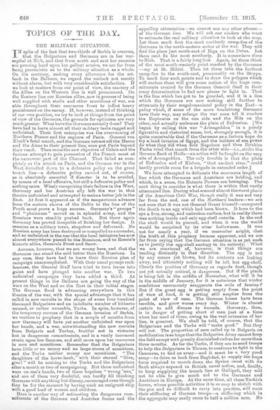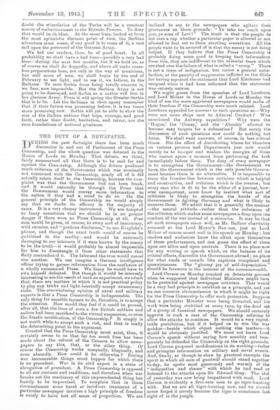TOPICS OF THE ]DAY.
THE MILITARY SITUATION.
IN spite of the fact that two-thirds of Serbia is overrun, that the Bulgarians and Germans are in her war- capital at Nish, and that from, north and east her enemies are pressing hard upon her gallant armies, we are far from, being pessimistic as to. the military situation as a whole.. On the contrary, making every allowance for the set- back in the Balkans, we regard the outlook not merely without athlete, but with very considerable satisfaction. If we look at matters from our point of view, the mastery of the. Allies. on the Western line is well pronounced. On the Eastern line our Russian allies, now in process of being well supplied with shells and other munitions of war, are able throughout their enormous front to inflict heavy punishment on the enemy. If, however, instead of thinking of our own position, we try to look at things from the point of view of the Germans, the. grounds for optimism are very much. greater. What havethe Germans actually done? They have had to leave almost all their military tasks ragged and. unfinished. Their first enterprise was the overrunning of Northern Prance and the capture of Paris. General von Eluck's• fatal march, and the German retreat via the Marne and the Aisne to their present line, soon put Paris beyond their reach. Then came the new objective of Calais and the furious attempt to gain possession of the French coast at the narrowest part of the Channel. That failed as com- pletely as the attack on Paris, and the German war in the West dwindled down to a defensive policy on the great trench line—a defensive policy carried out, of course, as is absolutely essential if disaster ir to be avoided, by means of a local offensive, but still a defensive policy and nothing more. Wisely recognizing their failure in the West, Germany and her Austrian ally left the war in that theatre unfinished and attempted to make a better job in the East. At first it appeared as if the tempestuous advance from, the eastern shores of the Baltic to the line of the Pruth must prove a. huge success. Germany's " groups "' and "phalanxes " moved on in splendid array, and the Russians were steadily pushed back. But there again Germany has proved incapable of finishing her design. It remains as a military torso, shapeless and deformed. No Russian army has been destroyed or compelled to surrender, and so unfinished is the war that the local initiative has now almost everywhere passed to the Russians, and to Russia's historic allies, Generals Frost and Snow.
Assume, however, that we are wrong here, and that the Germans can stand the cold better than the Russians. In any case, they have had to leave their Russian plan of campaign unaccomplished. With their usual prompt reck- lessness, the General Staff have tried to turn losses into gains and have plunged into. another war. To two unfinished campurigns they have added a third. At present things in the Balkans are going the way of the wars on the West and on the East in their initial stages. The German flood is advancing everywhere in this theatre of the war, with the special advantage that it has called in new recruits in the shape of some four hundred thousand Bulgarians and an indefinite number of hitherto unused, or rather unusable, Turks. In spite, however, of the temporary success of the German invasion of Serbia, we venture to prophesy that in a couple of months from now Germany will have yet another unfinished war upon her hands, and a war, notwithstanding the new recruits from Bulgaria and Turkey, fruitful not in victories but in dangerous commitments, and in a vastly increased strain upon her finances, and still more upon her resources in men and munitions,. Remember that the Bulgarians have little or no money and no large stores of muuitions, and the Turks neither money nor munitions. " The daughters of the horse-leech," with h their eternal " Give; give I " will be nothing to the Turks. and the Bulgarians after a month or two of campaigning. But three unfinished wars on one's hands, two of them hopeless. " wrong 'uns,," and one of them very doubtful, can hardly fill thinking, Germans with anything but dismay, encouraged even though they be for the moment by having sunk an emigrant ship with a good load of women and children.
Here is another way of estimating the dangerous• com- mitments of the German and Austrian forces and the appalling attenuation—we cannot use any other phrase— of the German line. We will ask our readers who want to, estimate the real military situation to look at the map. Lot them mark first the most northerly camp-fire of the Germans in the north-eastern sector of the war. They will find the place just south-east of Riga on the Dvina. Let. them next fix the most southerly. It is somewhere close toNish. That is a fairly long line. Again, let them think of the most south-westerly point reached by the Germans —say at St. Mild.. Then let them take the furthest camp-fire, to the south-east, presumably on the. Strypa. To mark four such points and to draw the polygon which will enclose them will give some notion of the huge com- mitments created by the German General Staff in their crazy determination to find new places to fight in. That is the line which has. got to be guarded, and it is a line which the Germans are now seeking still further to attenuate by their megalomaniacal policy in the East—a policy which, if some of the more headstrong Germans have their way, may enlarge the war zone till it reaches the Euphrates on the one side and the Nile on the other, and actually embraces the plain of Esdraelon. [We began by calling this war "Armageddon" in a purely figurative and rhetorical senue but, strangely enough, it is quite conceivable that if the Germans as a forlorn hope do. try a land. invasion of Egypt, and the holders of ilea power do what they did when first Napoleon and then Ibrahim Pasha, tried that march from the other side--i.e., strike the German flank at Haifa—an action will be fought on the very site of Armageddon. The only trouble is that the plain. of Esdraelon and of Kishon, " that ancient river," could hardly provide room for a brigade in extended order.]: We have attempted to delineate the enormous length of line which the Germans and Austrians are holding, and which, in a sense, the Entente Powers are besieging. The next thing to consider is what there is within that vastly attenuated line.. During what seemed almost theworst phase of the American Civil War, though really it was not very far from the end, one of the Northern leaders—we are not sure that it was. not General Grant himself—compared the South to an egg which had been blown. It bore to the eye a. firm, strong, and unbroken surface, but in reality there was nothing inside and only egg-shell outside In the end the shell would be pierced, and when it was the world would be surprised by its utter hollowness. It was not for nearly a year, if we remember aright; that. the truth of this prophecy became apparent, and wo are far from saying that the German situation is as yet such as to justify the egg-shell analogy in its entirety. What we are convinced of„ however, is that things. are tending distinctly in that direction. The egg is not by any means yet blown, but its contents are leaking, away, and ultimately nothing will be left but egg-shell. Clearly the position of Germany as regards food, though not yet actually critical, is dangerous. But if the pinch is being felt in the middle of November; what will' it be in the middle of January, for it is notorious that winter conditions enormously exaggerate the evils of famine ? But if the great egg is getting empty from the point of view of food, it is getting still emptier from the point of view of men. The German losses have been terrible, and grow' worse every day. Winter is almost certain to add disease to wounds. Germany. then, is in danger of getting short of men just at a. time when her need of them, owing to the vast extension of her line, is greatest. We shall be told, of course, that the Bulgarians and the 'Dirks will "make good." But they will not. The proportion of men called up in Bulgaria on mobilization lei° huge that the Bulgarian Army cannot keep the field except with greatly diminished cadres for more than three months. As for the Turks, if they are to send troops to help the Bulgarians in Thrace, to continue to fight in the Caucasus, to find an army—and it must be a very good army—to drive us bark from Baghdad, to supply the huge force required to .march down the Syrian coast with its flank always exposed to British naval action, and, finally, to keep. supplying the trench line at Gallipoli, they will not be able to give much aid to the Germans and Austrians in Europe.. At the same. time, all these Turkish forces, whose possible activities it is so easy to sketch with the pen and so difficult to carry into practice, will want their stiffening of German troops—a stiffening which in the aggregate may easily come to half a million mon. No • doubt the stimulation of the Turks will be a constant source of embarrassment to the Entente Powers. To deny that would be chldish. At the same time, looked at from the most optimistic, German point of view, the Serbian adventure must mean, if any good is to come of it, a vast call upon the personnel of the German Army.
We bid our readers, then, be of good heart. In all probability we shall have a bad timepossibly a very bad time—during the next few months, but if we hold on, as of course we shall do doggedly, and above all make cease- less preparations here, not only in the way of munitions, but still more of men, wo shall begin by the end of February to see light, and to see it, we believe, in the Balkans. To save Serbia from being totally overrun is, we fear, now impossible. But the Serbian Army is not going to be destroyed, and Serbia as a nation will live in her glorious Army. From it will spring the Greater Serbia that is to be. Let the Serbians in their agony remember that if their future was promising before, it is ten times more promising now. Serbia will yet be able to show the rest of the Balkan nations that hope, courage, and good faith, rather than doubt, hesitation, and terror, are the sure foundations of national greatness.







































 Previous page
Previous page